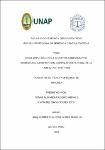Regulación legal de la gestación subrogada y su incidencia en la protección jurídica-constitucional de la familia en el Perú, 2020

View/
Date
2022Author
Rengifo Arévalo, Xiomar Alexandra
Torres Soto, Khyra del Chayo
Metadata
Show full item recordAbstract
Due to infertility that many people have been presenting, many of them have resorted to surrogacy to materialize their desires to have children and found a family. Surrogacy is a technique of assisted reproduction that in Peru, does not have a normative framework that regulates it in a certain way, according to the current advance of science in this field; situation that generates uncertainties about legal relationships, rights, duties and obligations regarding the conceived minor, the pregnant woman and the intended parents.
The main objective of the study was to determine how a legal regulation about surrogacy, can have a favorable impact on the legal - constitutional protection of the family in Peru. The research was of basic type and exploratory level, with components of a dogmatic - legal and sociological - functional research. It was found in the results that an express legal regulation on surrogacy is going to have a favorable impact on the legal protection of the family, so through it the filiation of the minor with the intended parents is recognized. In addition to guaranteeing fundamental right for instance: the right to reproductive health, founding and protecting the family as well as the protection of the best interests of the child. La infertilidad que vienen presentando muchas personas, las ha llevado a recurrir a la gestación subrogada para materializar sus deseos de tener hijos y fundar una familia. La gestación subrogada es una técnica de reproducción asistida que, en el Perú no tiene un marco normativo que la regule de manera cierta, de acuerdo al avance actual de la ciencia en este campo; situación que genera incertidumbres sobre las relaciones jurídicas, derechos, deberes y obligaciones vinculados al menor concebido, a la mujer gestante y a los padres de intención.
El objetivo principal del estudio fue determinar de qué manera una regulación legal sobre la gestación subrogada puede incidir favorablemente en la protección jurídica-constitucional de la familia en el Perú. La investigación fue de tipo básico y de nivel exploratorio; con componentes de una investigación dogmático-jurídica y sociológica-funcional. En los resultados se encontró que una regulación legal expresa sobre la gestación subrogada sí incidirá de manera favorable en la protección jurídica de la familia, debido a que mediante ella se reconoce la filiación del menor con los padres de intención, además de garantizar derechos fundamentales, tales como derecho a la salud reproductiva, fundar y proteger a la familia; así como también la protección del interés superior del niño.
Collections
- Tesis [81]

